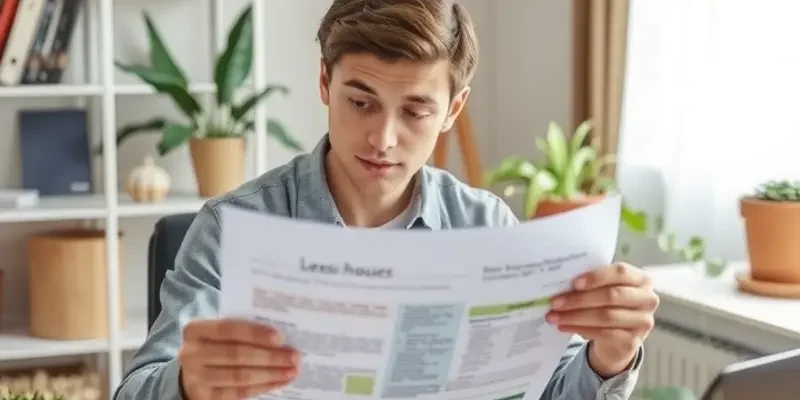Navigating lease expirations can be daunting for young professionals, students, and families alike, especially when unexpected challenges can arise. Whether you’re nearing the end of your first lease, preparing to move to a new city, or just seeking clarity on your rental rights, it’s crucial to have a solid plan. Understanding what your lease entails, recognizing critical deadlines, and knowing your options can make all the difference. This guide not only demystifies the process but also empowers you to take control of your housing situation. By fostering financial clarity and providing practical advice, we aim to ease your concerns and help ensure your next move is smooth and well-informed. From assessing your current lease to exploring renewal options or even considering a new rental, this article offers practical steps and friendly guidance tailored for various life stages. Let’s delve into effective lease expiration planning to ensure that you feel confident about your choices and ready for what lies ahead.
Understanding Your Lease: Know Before You Go

Navigating your first lease agreement can be a daunting task, but understanding the key elements will ensure a smoother experience. Each lease consists of terms and conditions that outline the specifics of your tenancy. Pay attention to the duration, rent amount, due dates, and any additional fees. Some leases include provisions for utilities or maintenance responsibilities, so be sure to clarify these aspects.
Be mindful of your rights and responsibilities as a tenant. This includes understanding the local rental laws, which can vary significantly depending on your location. To gain a better understanding of what protection you have, consider visiting resources like Renter’s Rights and Resources.
Key to any lease is the security deposit. Know the refund conditions, as landlords typically require the property to be returned in its original state, minus normal wear and tear. It is prudent to document the apartment’s condition upon move-in and move-out to avoid disputes regarding damage deductions.
As you consider the end of your lease term, it’s essential to be aware of renewal options. Some leases automatically convert to month-to-month arrangements, while others might require renegotiation or a formal renewal. Discuss renewal terms with your landlord well in advance to avoid surprises.
If circumstances change and you need to terminate your lease early, familiarize yourself with potential penalties. Lease agreements often include an early termination clause detailing any fees or conditions for breaking the lease. Open communication with your landlord can sometimes lead to favorable solutions, such as subletting with approval.
Effective communication with your landlord is vital throughout your tenancy. If issues arise, promptly report them in writing and keep records of all correspondence. Respectful and clear dialogue will support a positive relationship, which can be beneficial if you need leniency with lease terms or repairs.
Leasing can be complex, but arming yourself with knowledge helps mitigate stress. As your lease ends, evaluate new rental opportunities or consider remaining in your current dwelling under a renewed lease agreement. This proactive approach ensures a seamless transition, whether you stay or decide to move on.
Making Informed Decisions: What’s Next?
As your lease nears its expiration, it’s essential to navigate the next steps with a clear perspective. Should you renew your lease, renegotiate terms, or embark on the hunt for a new home? Each choice offers its own set of opportunities and challenges that require careful evaluation.
Start by assessing your current lifestyle and any changes. Have your needs evolved since you first moved in? Consider size, amenities, and location. A growing family or a job change might prompt a need for more space or shorter commutes. These factors weigh heavily when deciding whether to stay or move.
Next, scrutinize your financial situation. Can you comfortably afford a rent increase, or would moving be more economical? Compare your current costs with those of potential new locations, factoring in moving expenses and possible hidden fees. Evaluating financial health ensures you’re making a sustainable decision.
If you choose to renew, consider negotiating the lease terms. Research the market rates in your area to leverage a more favorable deal. For effective negotiation, emphasize your credibility as a tenant. Good tenants can often secure perks like minor upgrades or rent freezes.
Should moving be the preferred option, methodical exploration is crucial. Begin by researching available rental options. Utilize online platforms, community boards, and housing apps to find properties that align with your criteria. Remember, visiting potential homes is essential—prepare a checklist of questions to ensure the property meets your standards. For a comprehensive guide, consider reviewing resources such as this article on apartment viewing questions.
Once you’ve settled on a new place, timing your transition is pivotal. Check your current lease for notification requirements. Typically, landlords require a 30 to 60-day advance notice. Providing timely notice fosters goodwill and facilitates a smooth transition, allowing time to finalize new arrangements.
Finally, tackle the logistics of moving. Create a checklist to manage tasks efficiently, from booking movers to transferring utilities. Emotional preparation is vital too; transitioning from familiar quarters can be challenging, but keeping a positive outlook can ease the process.
By evaluating your personal situation and being proactive, whether renewing or relocating, you can ensure a seamless lease transition. Each decision reflects your growth and flexibility, setting the stage for the next chapter of your renting journey.
Final words
Planning your lease expiration doesn’t have to be overwhelming. With the right knowledge and preparation, you can navigate your options confidently. Understanding your lease details and making informed decisions puts you in control, whether you choose to stay, negotiate a new lease, or move on completely. Remember, this process is all about finding a living situation that aligns with your personal and financial goals. Take your time, ask questions, and seek assistance when needed. By doing so, you’ll set the stage for a successful transition into your next chapter.









